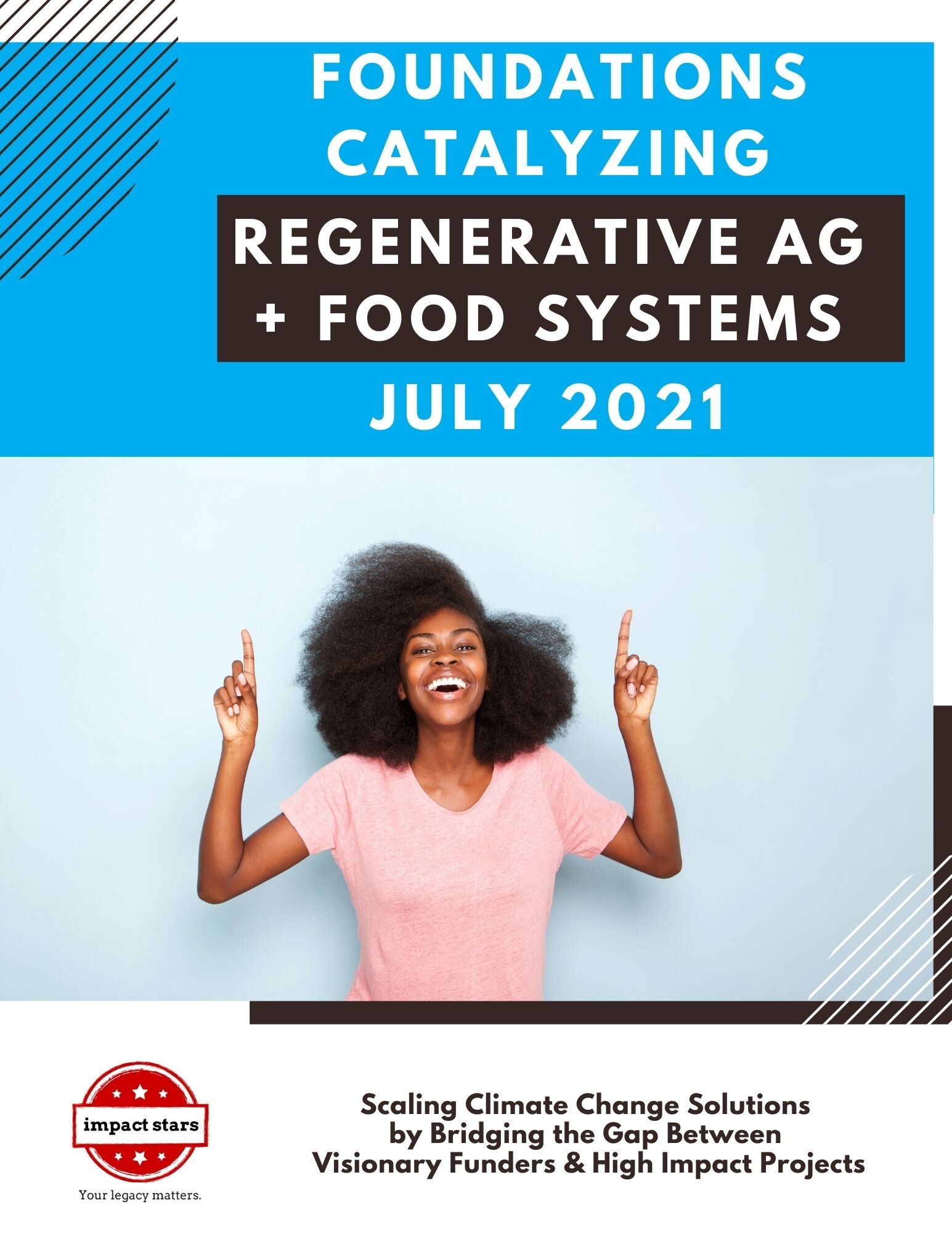Foundations Catalyzing Regenerative Ag + Food Systems: July 2021
Who They Are, What They Fund, and How They Select Grantees

In this in-depth directory, we have profiled the foundations with a track record of funding regenerative agriculture, food systems, and climate change. You can access the detailed PDF with information and insights about each grantmaker. When you download the PDF, you will automatically be notified of any updates and new funding sources. The Executive Summary and highlights are below.
If you’d like to share other funding sources, please let us know. You may also notify us of updates or corrections to be included in the next version.
FOUNDATIONS - GRANT APPLICATIONS OR OPEN TO LETTERS OF INQUIRY
-

American Jewish World Service
While not strictly focused on 'regenerative agriculture,' AJWS focuses on land and water rights, and environmental justice. They help those who are most affected by climate change, mining, pollution, and government corruption. AJWS studies social movements and has developed a tool for funders. They focus on rassroots organization working on advocacy in Africa, Asia, Latin America, and the Caribbean.
-

The David and Lucile Packard Foundation
It may feel intimidating to approach such a huge foundation, but remember, without partners on the ground, they wouldn't be able to achieve their mission. If you're working on land or water conservation, the Packard Foundation has developed quite a few novel financing tools. If you are located in the Western US, you may be able to connect more easily via their grantee, the Resources Legacy Fund.
-

Clarence E. Heller Charitable Foundation
If you're focused on regenerative agriculture in California, non-toxic communities or systems change in the agriculture sector, it may be worthwhile to look at the comprehensive list of their grantees, and decide if it's a good fit for you. The foundation funds Kitchen Table Advisors, a great technical and business assistance partner to regenerative farmers and ranchers in California.
-

Native American Agriculture Fund
The Native American Agriculture Fund provides grants for business assistance, agricultural education, technical support, and advocacy services to support Native farmers and ranchers. Organizations for Native farmers, ranchers, fishers, harvesters, and community producers. may apply. For example, grantee Alaska Village Initiative provides services to socially disadvantaged Alaska Native farmers, ranchers, and ag producers.
-

Gaia Fund
The Gaia Fund supports organizations like CalCAN and California Foodshed Funders. Though there's a definite California focus to their grantmaking, they have also given grants to national nonprofits such as the Bionutrient Food Association ($150,000), the National Young Farmer's Coalition ($60,000), and the Rodale Institute ($50,000). You will not need to educate them on regenerative agriculture — only why your project delivers systems-level impact.
-

Ira and Robert Gordon Family Foundation
Though the check sizes are smaller, the Ira and Robert Gordon Foundation has made strategic and timely gifts to further soil science as it relates to climate and sustainable agriculture. By betting on new solutions and nascent research, their small grants have led to federal funding, partnerships, and collaborations that would not have been possible otherwise. See my interview with Roberta Gordon here.
FOUNDATIONS - BY INVITATION ONLY
-

Woka Foundation
Though I had not heard of the Woka Foundation before embarking on this research, I was pleasantly surprised to see their list of grantees. They fund Mad Ag, a pioneer in regenerative ag, the International Biochar Initiative, as well as GreenWave, a promising ocean farming solution. They are open to considering projects that are high impact but lacking funder attention. They like a local element as well as a track record of success.
-

Regenerative Agriculture Fund
RAF was created with initial funding from the 11th Hour Project of the Schmidt Family Foundation. Other funding partners include the Cedar Tree Foundation, TomKat Ranch Educational Foundation, Globetrotter Fund, and Armonia LLC. They fund systems-level changemakers such as Fibershed. The Regenerative Agriculture Foundation has an invitation-only process for grantmaking. But they do allow you to submit your idea via a form on their website.
-

Lawson Valentine Foundation
The Lawson Valentine Foundation supports advocacy, organizing policies, and leadership development. It funds food systems such as local sustainable agriculture, food sovereignty, or workers’ rights in environmental justice. For example, the Carrot Project supports agricultural businesses, securing their futures by breaking down financial barriers. If you have a Northeast US focus, you may have a better chance of getting funded.
FOUNDATIONS - NOT ACCEPTING UNSOLICITED GRANT REQUESTS
Neesha’s Notes: Just because a foundation isn’t open to inquiries, doesn’t mean they won’t fund you. My clients have received funding from the foundations below.
Do exceptional work. Let them reach out to you or find someone they trust who can recommend your organization.
Instead of detailed profiles for these foundations, you’ll find brief summaries so you can get a sense for the types of projects they reach out to.
Globetrotter Foundation
The mission of the Globetrotter Foundation is to increase the resilience of mankind in the face of accelerating change.
Grantees include:
-Ecofarm (https://eco-farm.org/)
-Earth in Color (https://www.earthincolor.co/)
-Carbon Sponge (http://www.carbonsponge.nyc/)
-Civil Eats (https://www.noregretsinitiative.com/case-study/civil-eats/)
-Ecdysis (https://www.noregretsinitiative.com/case-study/ecdysis-foundation/
TomKat Foundation
We support the conditions for healthy human and natural life by championing GOOD MONEY GOOD FOOD GOOD ENERGY.
Grantees include:
-AEE Institute (https://www.aeeinstitute.org/homepage)
-Beneficial State Foundation (https://beneficialstate.org/)
-Point Blue Conservation Science (https://www.pointblue.org/)
-Center for Ecoliteracy (https://www.ecoliteracy.org/)
-Tomkat Ranch (https://tomkatranch.org/
The Americana Foundation
To support the sustainable development of agriculture and community food systems, as well as protecting natural resources and conserving early American heritage.
Grantees include:
-Diplomatic Receptions Room (https://diplomaticrooms.state.gov/)
-The Henry Ford (https://www.thehenryford.org/collections-and-research/services/conservation)
-Our Kitchen Table (https://oktjustice.org/resources/)
-Old Sturbridge Village (https://www.osv.org/)
-Michigan State University Foundation (http://www.americanafoundation.org/grantview.asp?gid=77)
Vatheuer Family Foundation
To improve the quality of life of the indigenous population and to further the local economy through agricultural projects.
Grantees include:
-Green Empowerment (Green Empowerment | Village Solutions for Global Change0-Project 41 (Project41 (p41.org))
-Bridge Meadows (Bridge Meadows - A Multigenerational Housing Community)
-University of Washington Tacoma (UW Tacoma Home | UW Tacoma)
-Sustainable Agriculture and Food System Fund (Home | Sustainable Agriculture & Food Systems Funders (agandfoodfunders.org)
The Dixon Water Foundation
To promotes healthy watersheds through sustainable land management to ensure that future generations have the water resources they need.
Grantees include:
Many of our grants support projects that make use of Dixon Ranches and other properties managed by the foundation.
For example, the foundation has funded long-term research on grazing management on our ranches, as well as education programs that use our ranches as laboratories for learning about land stewardship and water conservation.
Grants are awarded to non-profit organizations, preferably in Texas, that are recognized as charitable organizations by the Internal Revenue Service. Notably, they have funded the grazing research of Dr. Richard Teague.
The Dixon Water Foundation promotes healthy watersheds through sustainable land management, to ensure that present and future generations of Texans have the water resources they need. The Foundation believes carefully managed livestock grazing can be a tool for creating healthy land, healthy watersheds, and healthy living for all.
The 11th Hour Project
Building resilient systems for food, energy, and human health.
Grantees include:
-Columbia River Keeper (https://www.columbiariverkeeper.org/)
-Food & Water Watch (https://www.foodandwaterwatch.org/)
-Cecide (https://www.cecideguinee.org/
-Resource Matters (https://resourcematters.org/)
-Civil Eats (https://civileats.com/)
Lydia B Stokes Foundation
The Foundation is committed to the Quaker philosophy of peace and justice. They focus on social and economic justice, regenerative organic agriculture, viable ecosystems with healthy communities in order to promote a world that has healthy food systems.
-American Farmland Trust (https://farmland.org/)
-American Friends Service Committee (https://www.afsc.org/)
-CISA (https://www.buylocalfood.org/)
-Forge City Works (https://www.forgecityworks.org/)
-Cultural Arts Coalition (http://www.culturalartscoalition.org/)
-For Age Farm (http://www.foragefarm.org/)
